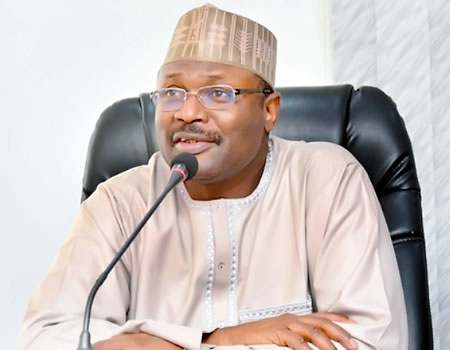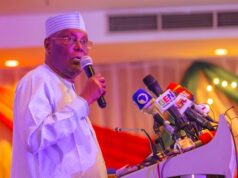By SANUSI MUHAMMAD
In his opinion on the model of democracy Nigeria operates and how to defeat the cancer of rigging elections for true democracy to survive, a 2019 Wase Federal Constituency contestant from Plateau State, Hon. Umaru Sule (Barden Wase), said: “In developing or raw and crude politics spiced with corrupt practices, uprooting a sitting president, governor etc through conventional method of election has always been a daunting task but not impossible
“Those to be uprooted for failure to deliver what is expected from them while in power, have perfected a plan to scuttle every effort deployed by those in the struggle including the use of compromised security agents and INEC ad-hoc officials to rig the elections that has been the albatross of credible governance
“They have gone the extra mile by imposing their stooges on the local government administration to serve as their rigging machines while hooligans and vandals are sponsored to rig the results in favor of their pay masters. We have seen how 9000 clean votes of the PDP in the 2019 election were voided on the directives of a compromised system
“For 2023 elections, Nigerians should wake up to counter any rigging strategy to nip the problem in the bud for the good of the democracy.”
Our electoral history is full of proofs as also the 2019 electoral victory of President Buhari, Governor Lalong of Plateau State and several others. We have never succeeded in removing a sitting president or state governor in our electoral history until 2015. Indeed, we have never succeeded in stopping any of their anointed successors except in few cases.
A onetime governor of a state in the South-South was defeated at the election when he sought for a second term but that was only possible because he lost the support of the presidency, which controls the incumbency forces of rigging. This was also the case when in 2007 the outgoing governors of Adamawa and Bauchi could not see those they anointed through. The only new developments were those of Governors Ali Modu Sheriff of Borno State and Ahmadu Adamu Mu’azu of Bauchi State, who were defeated in 2007 and 2011 senatorial elections. Sheriff had wanted to return to the senate from where he earlier fired the shot to Borno Government House in 2003.
This was historic nevertheless but can change the total picture. There was also the defeat of Akala Alao of Oyo, Shinkafi of Zamfara and Aliyu Akwe Doma of Nasarawa state. Positive developments for sustenance!
Shehu Shagari, Obasanjo and Buhari have all proved the theory beyond any doubt. Indeed, the results of the election for their second bids turned out to be more outrageous. Consider Shagari’s ‘landslide’ in 1983, Obasanjo’s near perfection of a one party state in 2007.
Look at the questionable votes received by Jonathan in 2011 from the South-South and South-East respectively. What of his clean sweep of the South-West, a victory that will remain topical for years to come!
But what informed those victories? Take the PDP victories of 2003, 2007 and 2011. All came at a time when Nigerians were thoroughly fed-up with its incompetence, poor performance and unprecedented corruption. There was also the case of an almost completely destroyed infrastructure and rising insecurity courtesy of the dreaded Boko Haram insurgents. With these obvious facts, it was easy to conclude that no person with clear conscience could ever think of returning PDP to power in 2011. Yet, the opposite was the case.
What could be responsible? The answer remains the incumbency factor. It consists of free federal government funds, deployment of compromised security agencies, state-controlled electronic media etc all at the beck and call of the president and/or the state governors, which they misuse and deploy to their exclusive and personal advantages.
A Nigerian president and state governors do not spend a dime from their personal resources to fund their campaigns. Rather, they use public funds, facilities and instruments against contesting opponents.
During the 2011 presidential election, governors seen to be in ‘problematic state’ were allegedly given N2 billion each to facilitate Jonathan’s return to power in the respective states.
Five or so prominent Northern so-called elders were reportedly dispatched with billions of public funds to bribe Northern traditional rulers and some selected leaders of thought in the region. One of the delegates was a well known critic of Jonathan, who suddenly changed colour as an ardent admirer in a most dramatic manner. But why the sudden change? Because he was bribed and lost his pride!
The NTA completely turned over to the PDP and Jonathan as was the case in PDP-controlled states. Opposition parties were completely blacked out and denied a mention in those state-controlled electronic media. Not only that even their paid advertorials were out rightly rejected by those compromised stations.
In such states, it became problematic for opposition parties to secure campaign venues. The police reportedly, murdered six CPC members in Jos, Plateau state during the presidential campaign visit of Muhammadu Buhari in 2011. In Abia, Adamawa, Niger etc, the story was the same while in Bauchi, it was a post-election violence that erupted even as Muhammadu Buhari had won in the state against Jonathan with nine Youth Corp members killed.
Using state funds and resources, traditional rulers, religious leaders, opinion leaders etc were allegedly induced and quickly joined the Jonathan train. It was a total conquest of those who mattered through the corrupt use of federal resources.
When we put all these together, the clear picture was pre-election rigging on a most corrupt scale as several media reports indicated. Never was huge public funds pumped into electing a Nigeria president on a scale unprecedented in corruption, this was how the 2011 presidential election was partly rigged and said to have been won. As stated, this has been the case with elections in Nigeria since independence.
The obvious fact is that no matter how poorly a Nigerian president performs or how corrupt or immoral his regime is, he will always emerge victorious in any election as would also someone anointed by him, as in the case of the late Yar’Adu’a. Our electoral history has proved that.
It has similarly demonstrated that where an outgoing incumbent wasn’t keenly interested in his successor, electoral outcome has been relatively free and fair. Check the list: 1959, 1979, 1992-93 and 1999. The lesson here is that incumbents, especially their common greed, are central to the corrupt nature of our electoral democracy and this would remain so until the situation is reversed.
How? The ongoing constitution review should include that the president and governors plus some of their key appointees, especially in the security service, vacate office at least six months to election and in the interim, a presidium be constituted to oversee affairs until after the elections.
Doing that, may deny incumbent access to free state funds for waste, which they might have squandered for their campaigns.
The counter argument to this proposal has been that no country practices such a formula or that it is not practiced in advanced democracies. That may be true. But then, no sitting president, prime minister or governor in the said advanced democracies dares touch a dime of public funds for his personal campaign. In Germany for instance, the Chancellor fuels any official vehicle assigned to him/her from his expenses anytime he/she is on any private trip. This reminds me of a former Brazilian president who was on an official trip to a certain town where his political party executives were having a meeting. He called briefly at the venue of the meeting and continued with his official trip. Some activists dragged him to the court for misusing official hours to attend to his party affair. He was consequently found guilty of using state facility for his private interest. He was ordered to refund the cost of fuelling the state aircraft, which conveyed him to the town where the meeting was held. In Nigeria, you would be eaten raw by sycophants if you dare drag the president or any public official to court for such an act.
Our laws or dos’ should not be measured vis-a-vis practices elsewhere but against the background of our queer and raw democratic mannerism. You can talk of so called equal and even playing field when incumbents have limited access to state resources and facilities for their companions, while other contestants don’t by any standards. Such disparity is immoral and above all corrupt.
In conclusion, the so-called incumbency factor is the most corrupt element in the Nigerian electoral system, tactically and tacitly sanctioned by law such as for us to conclude that they were drawn up to corruptly favour incumbents. When PDP officials beat their chests that they were going to rule Nigeria for 60 years, it was because the corrupt rigging machine under the control of the presidency would always be deployed in their favour, as happened during all the past presidential elections. Without that, there was no way Obasanjo could have returned to power in 2003, Yar’Adu’a in 2007, Jonathan in 2011 and Buhari in 2019. We should look critically into how incumbents corner public funds for their personal campaigns. If we are sincerely committed to strengthening the ethos of our democracy, we should do the needful. That can best be handled by the national assembly but unfortunately the 9th National Assembly is a huge mistake. We have more of contractors than lawmakers. We have more of sycophants than patriots. We have more of less educated than the educated with exposure. The situation is worrisome that deserves change in 2023.
*Muhammad is a commentator on national issues
- Tinubu to IMF: We’ll provide safety nets for Nigerians to cushion reform’s effects - November 21, 2024
- Bauchi suspends 6 civil servants for stealing govt properties - November 15, 2024
- Zacch Adedeji: And the revenue keeps increasing… - November 15, 2024










